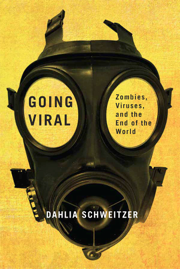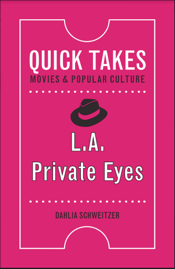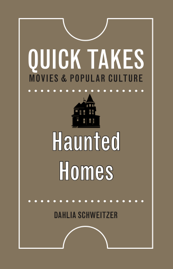
About Dahlia
DAHLIA SCHWEITZER is a pop culture critic, writer, and professor. Described by Vogue as “sexy, rebellious, and cool,” Schweitzer writes about film, television, music, gender, identity, and everything in between. She studied at Wesleyan University, lived and worked in New York City and Berlin, and completed her MA and PhD at the Art Center College of Design and UCLA. She is currently chair of the Film and Media department at the Fashion Institute of Technology in New York City.
In addition to her books, Dahlia has essays in publications including Cinema Journal, Journal of Popular Film and Television, Hyperallergic, Jump Cut, Quarterly Review of Film and Video, and The Journal of Popular Culture. She has also released several albums of electronic music, including Plastique and Original Pickup.

Professor
As a professor of film and media studies, Dahlia exposes her students to a variety of theoretical approaches and cinematic techniques, asking them to approach both with analytical inquisitiveness. Her aim is to pass her own curiosity on to her students, encouraging them to think across their classes and experiences to create intellectual connections between course materials and the world in which they live. She strives to remind her students that the loudest voice is not necessarily correct, and in so doing, helps them find their own.

Media Critic
Declared “one of the world’s leading analysts of popular culture” by renowned author Toby Miller, Dahlia writes about film, television, music, gender, identity, and everything in between. Her work can be found across mainstream, academic, and emergent channels in both long and short form. Repeatedly drawn to popular culture, Dahlia loves to analyze and unpack cultural artifacts in order to explore how they reflect social and historical issues, as well as looking at how they reinforce or interrogate common cultural assumptions.

Author
Dahlia has written numerous books exploring aspects of film and television. Regardless of the topic—serial killers, private detectives, or even zombies—all of her writing engages directly with questions of self versus other, private versus public space, examining depictions of gender, identity, and race. She traces how these depictions evolve and examines what they mean about our changing world. In her latest project, Dahlia explores the ways haunted homes have become a venue for dramatizing anxieties about family, gender, race, and economic collapse.
Blog
I Was An LAPD Reject (part one)
I wanted to be a spy when I grew up, until my mother told me that girls don't play with guns. Then I decided I would be Lady Diana, instead.But the fascination with cops and criminality didn't stop. It just grew latent, relegated to fiction and television shows, and a voyeuristic fascination every time those blinking sirens whirred by.Then there was a shooting on my block. One morning, on my way to work, I walked out of my building to a scene from CSI. The street was roped off with bright...
Mother Misfit and the Absence of Sex (Appeal)
In honor of her upcoming album, and the, um, eye-catching new cover art for her collaboration with R. Kelly, I've pulled this piece out of the archives:Recently, the Council of Fashion Designers of America gave their Fashion Icon Award to Lady Gaga. This award has been given out only five times since 1981, with previous winners ranging from the model Iman to the actress Sarah Jessica Parker and the legendary C.Z. Guest. An immediate reaction is to question whether Lady Gaga can be considered...
Honesty in Dating, R.I.P.
In my Critical Thinking class, I routinely assign an essay about Herman Rosenblat. (For those who haven’t heard about him, he wrote the book Angel at the Fence, which he claimed was a true story about his experiences during the Holocaust but which turned out to be fiction.) After my students read the essay, they are often outraged by Rosenblat’s lies, and it sparks an interesting conversation about truth versus entertainment, and our general expectations for honesty in the media. However,...




